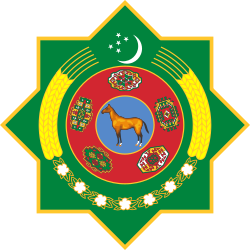| | ||||||||||||||||||||||||||||||
| ||||||||||||||||||||||||||||||
All 125 seats in the Assembly 63 seats needed for a majority | ||||||||||||||||||||||||||||||
| Turnout | 91.69% | |||||||||||||||||||||||||||||
|---|---|---|---|---|---|---|---|---|---|---|---|---|---|---|---|---|---|---|---|---|---|---|---|---|---|---|---|---|---|---|
This lists parties that won seats. See the complete results below.
| ||||||||||||||||||||||||||||||
 |
|---|
Parliamentary elections were held in Turkmenistan on 25 March 2018, alongside local elections. [1]
| | ||||||||||||||||||||||||||||||
| ||||||||||||||||||||||||||||||
All 125 seats in the Assembly 63 seats needed for a majority | ||||||||||||||||||||||||||||||
| Turnout | 91.69% | |||||||||||||||||||||||||||||
|---|---|---|---|---|---|---|---|---|---|---|---|---|---|---|---|---|---|---|---|---|---|---|---|---|---|---|---|---|---|---|
This lists parties that won seats. See the complete results below.
| ||||||||||||||||||||||||||||||
 |
|---|
Parliamentary elections were held in Turkmenistan on 25 March 2018, alongside local elections. [1]
The 125 members of the Assembly were elected in single-member constituencies by first-past-the-post voting. [2] A turnout of at least 50% of registered voters is required to validate the result in a constituency, forcing a repeat of the election in it if not attained.
A total of 284 candidates contested the elections; 117 from the Democratic Party, 28 from the Agrarian Party, 23 from the Party of Industrialists and Entrepreneurs and 116 as independents. [3]
The 2018 OSCE election observer mission noted,
The 25 March elections lacked important prerequisites of a genuinely democratic electoral process. The political environment is only nominally pluralist and does not offer voters political alternatives. Exercise of fundamental freedoms is severely curtailed, inhibiting free expression of the voters’ will. Despite measures to demonstrate transparency, the integrity of elections was not ensured, leaving veracity of results in doubt. [4]
 | |||||
|---|---|---|---|---|---|
| Party | Votes | % | Seats | +/– | |
| Democratic Party of Turkmenistan | 55 | +8 | |||
| Party of Industrialists and Entrepreneurs | 11 | –3 | |||
| Agrarian Party of Turkmenistan | 11 | New | |||
| Independents | 48 | +41 | |||
| Total | 125 | 0 | |||
| Total votes | 3,017,801 | – | |||
| Registered voters/turnout | 3,291,312 | 91.69 | |||
| Source: CEC, [htp://archive.ipu.org/parline-f/reports/1325_E.htm IPU] | |||||